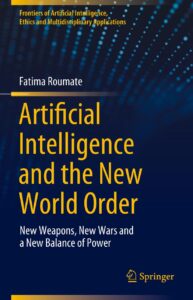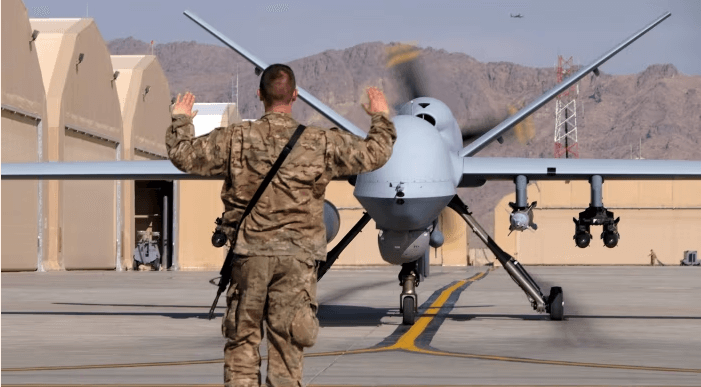World Geostrategic Insights interviews Fatima Roumate on how the increasing use of artificial intelligence (AI) weapons on the battlefield may overthrow the current fundamentals of warfare, paving the way for future conflicts, how AI arms are fostering a new international balance of power, and a new world order, and whether international cooperation to regulate AI weapons is possible.

Fatima Roumate, (PhD) and Doctor Honoris Causa, is President of IIRS, International Institute for Scientific Research, and Founding President of the Global Network on AI and International Society GNAI&IS. She is member of the UNESCO Ad Hoc Expert Group on the Ethics of Artificial Intelligence and Full Professor of International Law at Mohammed V Agdal University in Rabat, Morocco. Fatima is a member of several scientific board committees of indexed journals and she has published several books and indexed articles in Arabic, French, and English
Q1 – AI is often considered a tool for asymmetric warfare. In reality, AI-enabled weapons already exist and are already used in real military operations, so this is not a science fiction topic. There is a strong willingness on the part of major powers to increasingly integrate these new weapons into their military strategies and to use them more and more on the battlefield. According to the overwhelming majority of AI experts, lethal autonomous weapons capable of target selection and firing without human intervention will be widely present on the battlefields within ten to twenty years at most. What are your thoughts on this? You have just written a book, which is about to be published by Springer, on “Artificial Intelligence and the New World Order: New Weapons, New Wars, New Balance of Power”, is the issue of military AI a challenge we will have to face from now on?
A1 – Lethal Autonomous Weapons (LAWs) are systems that can independently identify and engage targets without direct human involvement. This topic raises a significant global debate considering both legal and ethical challenges related to international law and AI ethics with a special focus on responsibility and accountability.
It’s a real risk to delegate the responsibility to machines considering Generative AI (AGI) and all current and future advances in this field. AGI are now with self-recognition and emotion but without empathy. The question here is how we can delegate the responsibility to AGI with recognition and emotion but without empathy for humans? This could increase the risk when machines are on the loop or out of the loop because they could identify a target from civilians and they will not make a difference between persons who are protected by the international humanitarian law and soldiers. LAWs will increase threats considering that AI could surpass human intelligence like the AI system used by ALPHAGO. This game is a Google AI algorithm that beats Human GO Champion.
The question is, what will be the future of humanity if LAWs based on this kind of system are used in the Ukraine war? AI has been widely used in this war since the beginning and on several levels such for coordinating during military operations.
The use of AI in the military will increase much more with industry 5.0 and in the near future with industry 6.0. This leads us to another important question which is decision-making considering symbiotic interactions between humans and machines. AI and AGI are revolutionizing weapons, and they are used in diverse types of weapons and wars. They are largely used in Ukraine and Gaza. For psychological warfare, AI is currently used differently in these two wars. AI is used to support Ukraine and to isolate Russia as a kind of sanction because of its military operations in Ukraine. AI is used by Israel in its war against Palestine as it’s used by western countries under the leadership of the USA to support Israel. These two cases show double standards in the application of international law from Western countries: supporting Israel in Gaza and isolating Russia in the Ukrainian war.
AI as new weapons are a significant characteristic of this new world order: killer drones, and autonomous airplanes on the modern battlefield are now in the center of the global debate. The United Nations is focusing on the challenges related to these new weapons empowered by AGI.
 These ideas and others are discussed profoundly in my new book titled “AI and the New World Order: New Weapons, New Wars and a New Balance of Power” which will be published by Springer in April 2024. This book discusses the implications of artificial intelligence (AI) on post-COVID-19 international relations. With the decline and fall of U.S. global leadership and the emergence of new powerful actors, as hastened by the global pandemic, new arms are now used in new forms of wars with new players. The balance of power swings between geostrategic interests and those linked to the global governance of virtual space and the race to technological sovereignty. Chapters focus on the challenges imposed by these changes on various parts of the international system—law, governance, diplomacy, international psychological security—and articulate new strategies and ethical policies as practical solutions. The volume is interdisciplinary and will appeal to researchers, students, and professionals across fields interested in the ethics of AI in the international system.
These ideas and others are discussed profoundly in my new book titled “AI and the New World Order: New Weapons, New Wars and a New Balance of Power” which will be published by Springer in April 2024. This book discusses the implications of artificial intelligence (AI) on post-COVID-19 international relations. With the decline and fall of U.S. global leadership and the emergence of new powerful actors, as hastened by the global pandemic, new arms are now used in new forms of wars with new players. The balance of power swings between geostrategic interests and those linked to the global governance of virtual space and the race to technological sovereignty. Chapters focus on the challenges imposed by these changes on various parts of the international system—law, governance, diplomacy, international psychological security—and articulate new strategies and ethical policies as practical solutions. The volume is interdisciplinary and will appeal to researchers, students, and professionals across fields interested in the ethics of AI in the international system.
Q2 – AI adds an extra dimension to any weapon: autonomy. In fact, AI enables faster analyses and execution, making it possible to operate more or less without human intervention. Will this revolutionize the art of warfare? To what extent is AI changing the conventional notion of war? Does AI overturn the current fundamental principles of warfare, paving the way for future wars?
A2 – In the era of AI and Lethal Autonomous Weapons, we observe new types of war and new types of weapons, for example the enhancement of AI use in psychological warfare and cyber-attacks. AI and AGI are largely used to empower Genetic engineering as a new technique of biological warfare. Biological weapons could be used directly or indirectly during conflicts which means that AI enhances the threat of such attacks on public health and it’s consequences will be profoundly serious. These weapons covered a large variety of unconventional weapons including chemical, nuclear and radiological weapons.
This leads us to the level of AI autonomy used in laboratories, especially if humans were replaced with a full autonomy increase. That increases the feasibility of the creation of chemical weapons by AI. As a result, these evolutions related to the large use of AI in different types of war are revolutionizing international public law and international humanitarian law. Rethinking principal notions in both laws is necessary. New international binding instruments are needed to face all the threats and challenges imposed by AI to the international society. AI is creating a huge transformation in international security and conflict resolution. This appeal for a new international institution instead of the United Nations which is surpassed by AI evolutions and its implications on international security considering the new balance of power.
The use of AI revolutionizes various aspects of military operations ranging from autonomous decision-making for target selection and engagement to the surveillance system to predict military operations and identify potential threats. While traditional warfare has involved human decision-making, AI introduces new dynamics to military operations. AI is used in the Ukraine and Palestinian war to optimize logistics and supply chain management in military operations. And the most important is that one of the most important elements which helped Hamas to attack Israel on October 7 is the non use of AI and no presence in the internet in general. That means that AI has a double implication: the use of AI can help and facilitate military operation and non use of AI can do the same. War in GAZA is a significant example and the only case until now which shows that the non use of AI can help small states to defend their rights to remain as a state.
While AI offers new opportunities, it also raises profound ethical, legal, and strategic challenges. The responsible and ethical use of AI in warfare requires careful consideration of these challenges to ensure that military applications align with international norms and humanitarian principles. International cooperation and the development of ethical guidelines are crucial in navigating the evolving landscape of AI in warfare.
While AI introduces transformative elements, it’s important to recognize that many enduring principles of warfare, such as the importance of weapons, power, technological sovereignty, and international peace and security remain relevant. Rethinking legal frameworks that govern warfare is needed as much as an ethical framework related to AI. That means global AI regulation is urgent to ensure a responsible use of AI in ways that align with international principles and humanitarian values.
Q3 – The development of AI-enabled lethal weapons, and the real willingness of governments to integrate them into their military strategy, represent an international threat and challenge. These new weapons bring new possibilities, new military behaviors, and a new lever of power for the states that deploy them. It is therefore legitimate to expect international players to adapt, and thus to upset the balance of power in the world order. Depending on countries’ access to this new tool of power, the world order could well be turned upside down. What role does the AI military play in the confrontation between the world’s leading power, the United States, and its main challenger, China? Will AI weapons lead to a new international balance of power? If so, what kind of new world order can we expect?
A3 – AI has a significant impact in all fields, economic, military, political and diplomatic. This impact ranges from digital transformation in industry with industry 5.0 and in the near future with industry 6.0 to AI transformation of international security and conflict resolution. AI increases the three types of power which are hard power, soft power and smart power. Therefore, these three types of power start by a good education system which is the starting point for the state to enhance its place in the international society.
All these three types of power are conditioned by the ability of the state to ensure a good education and good higher education to achieve two important goals; the first one is the ability of the state to reinforce innovation and creativity which also means its ability to ensure technological development and technological sovereignty. The second goal is the enhancement of scientific and technological culture which is important to ensure the inclusion of all actors and citizens in technological development considering that culture in a large sense is one of the most important pillars of soft power. For that technological culture is important to raise awareness of how AI could be used to create political changes inside countries by enemies.
So education and technological culture are necessary to ensure the state’s technological sovereignty and to enhance the state’s power in international society. AI implications on education, science, innovation, culture, economy, military, etc are influencing also the balance of power ranging from geostrategic interest to technological sovereignty. War in Ukraine and in Gaza are an argument of this new balance of power based on hard, soft and smart power and the ability of the state to be powerful in these three levels. For example the global investment on AI shows that the USA is leading in private investment, but China is leading in public investment. Currently the USA is the first economic power, tomorrow (in a few months) China will be the first economic power in the world and Rusian economy become powerful because of western sanctions since the beginning of the war in Ukraine.
The USA is leading in innovation followed by China but China is leading in 5G. USA is leading in military power with the use of AI but Russia is the powerful nuclear weapon surpassing USA and it’s the fifth powerful state in Lethal Autonomous Weapons. The result is that multipolar world order is an obligation imposed by recent and future evolutions not a choice. These powerful states should rethink rules and international mechanisms for the new world order to ensure global governance considering the new balance of power and all challenges and threats imposed by AI to the international society and to humanity.
Q4 – Weapons AI carries a number of risks for which the world seems not yet ready, whether technically, geopolitically, ethically, or legislatively. Is there a possibility of international cooperation to regulate these weapons more safely and avert a possible catastrophe for humanity?
A4 – International cooperation is the only way to save humanity in the era of AI and Lethal Autonomous Weapons. Otherwise any direct military confrontation between Russia and USA or between USA and China with the use of Lethal Autonomous Weapons could escalate to the end of humanity considering the level of autonomy of these new types of weapons and all what we discussed in the previous question about biological warfare and the use of AI by laboratories. In the era of AI, international society is facing huge threats considering geostrategic interest and the geopolitics of AI. In a sense international cooperation, bilateral and multilateral is the only way to rethink the international system, international institutions and international public law to ensure let’s say international order to be more realistic instead of being a dreamer and looking for international peace and security.
Lot of voices are calling for a new international treaty that would ban Lethal Autonomous Weapons such as the Convention on Certain Conventional Weapons CCW known formally as the Convention on the Prohibitions or Restrictions on the Use of Certain Conventional Weapons entered into force in December 1983. Another protocol could be added to this convention related to LAWs such as Laser Weapons. In a sense, global debate around disarmament related to LAWs with a focus on putting an end to scientific research projects aimed to develop LAWs out of the loop and weaponization of super AI considering that we already have an experience of an AI which was superior to humans. The question here is what will be the future of humanity if this kind of invention is used by terrorists or even by states to create LAWs out of the loop? Debate around LAWs leads us to the importance of a new international organization such as the International Agency on nuclear energy.
Fatima Roumate (PhD) and Doctor Honoris Causa – President of the International Institute of Scientific Research, Founding President of the Global Network on AI and International Society GNAI&IS
Image Source: Reuters







